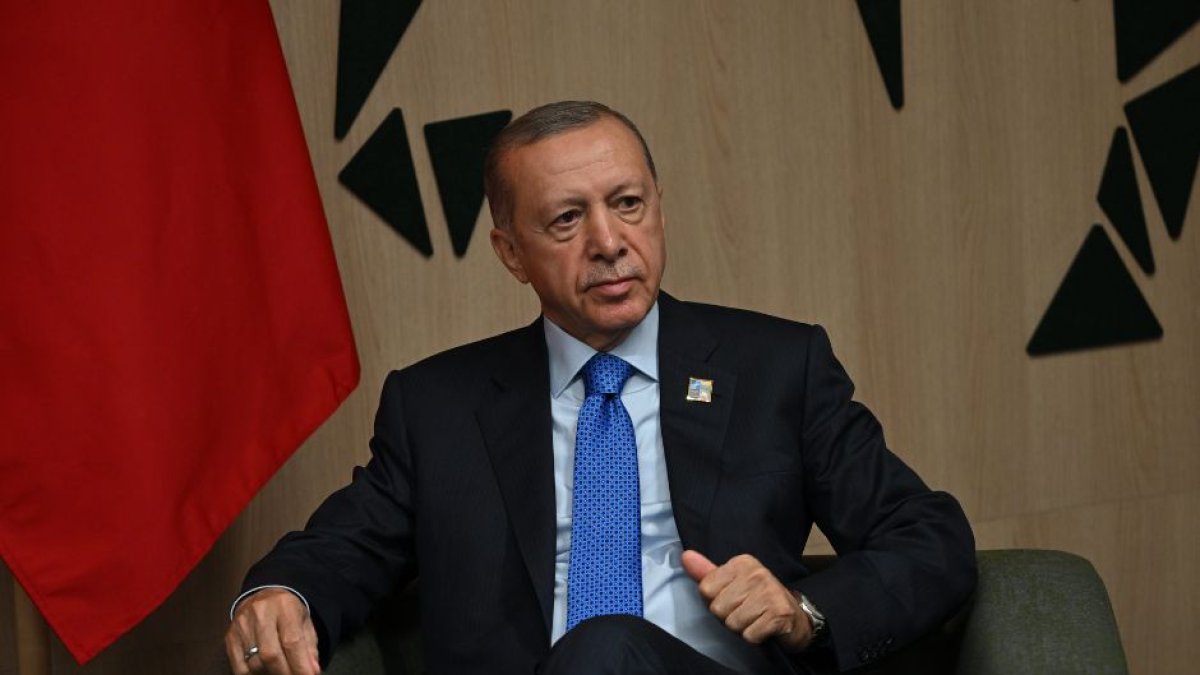Following the Turkish president's threat to invade Israel, tension between the two countries escalates
Erdogan, whose country belongs to NATO, has a long history of hostility towards the Jewish state and has recently even threatened to invade its territory or arm terrorist forces.

Turkey's President Recep Tayyip Erdogan has been hostile toward Israel for many years. However, he has never threatened to invade the Jewish state or arm terrorist organizations as he did this Sunday. "Just as we went into Karabakh and Libya, we will do the same with Israel," the Turkish leader said during a meeting of Erdogan's political force, the Justice and Development Party (AKP), in northern Turkey.
The president, whose country is a member of the North Atlantic Treaty Organization (NATO), referred to the Nagorno-Karabakh armed conflict between Azerbaijan and Armenia, in which he supported Azeri forces. However, he did not intervene directly in the Libyan civil war, in which he was directly involved in 2020 when he sent troops to support the UN-recognized Government of National Accord.
"We will do the same with them, there is no reason why we can't," Erdogan said. He added: "We just need to be strong to be able to take these measures. We need to be very strong so that Israel cannot do this to Palestine."
Israel Katz, Israel's foreign minister, responded forcefully to the Turkish president. "Erdoğan follows in the footsteps of Saddam Hussein and threatens to attack Israel." And he suggested, "remember what happened there and how it ended," he said.
Yair Lapid, leader of the Israeli opposition, also took aim at Erdogan. He "is ranting and raving again” and “is a danger to the Middle East," he said. "The world, and especially NATO members, must strongly condemn his outrageous threats against Israel and force him to end his support for Hamas," he added.
Can Turkey go to a direct war with Israel?
In 2018, Erdogan's party announced that it intended to create the "Army of Islam" to fight Israel. However, it seems unlikely that Turkey could defeat the Jewish state in a direct war. Nevertheless, one Israeli analyst believes Ankara's threats should be taken seriously.
In an article published for the Israeli news portal Mako, Israeli journalist Shai Levy indicated that Turkey has a large army in terms of personnel and equipment, but has suffered from a severe crisis since the failed coup attempt against Erdogan in 2016. As a result, the Turkish ruler carried out a massive purge, arresting or dismissing thousands of professional and experienced officers and soldiers.
The Israeli journalist stressed that Turkey has a vast army, the largest in NATO after the United States, which also often conducts all kinds of trainings with other forces of that international organization that are allied with Israel, which makes it, according to Levy, a serious threat.
The journalist added that despite training with Western armies, the Turkish army, in comparison to Israel, has no experience in large-scale warfare. The last time it was involved in such an armed conflict was in Cyprus in the 1970s.
Levy further remarked that even in the war Turkey is waging against the Kurds, mainly in Iraq, the Turkish army has not achieved major victories. On the contrary, it has suffered heavy losses and has even committed serious war crimes.
The Israeli reporter argued that while the Turks have more tanks and armored and artillery vehicles, most of these are old. Moreover, Levy added that Israel has a significant technological and human advantage. However, he noted that the technology-related difference between one army and the other is reduced in the maritime domain, where Ankara has more submarines, missile launchers and various equipment that the Jewish state does not have.
Another drawback the Turks would have in invading Israel is the fact that they do not have a border with the Jewish State, the Israeli reporter argued in his analysis.
Erdogan's Turkey's recent hostilities toward Israel
Before Israel's war against Hamas and other terrorist groups broke out, the Turkish president was working to rebuild relations with the Jewish state, both with the previous and current governments. Indeed, weeks before the October 7 massacre, Erdogan met with Israeli Prime Minister Benjamin Netanyahu in New York.
However, since the war began, Erdogan has resumed his usual violent rhetoric against Israel. The Turkish president even stated that Hamas is not a terrorist organization, received some of its top commanders and praised them.
In May, Erdogan also announced the suspension of trade with the Jewish state, although Ankara later partially relaxed the decision.
In June, Turkey increased the climate of hostility by taking an unprecedented decision to violate the bilateral aviation agreement it has with Israel. On that occasion, Antalya airport refused to refuel an Israeli plane that had landed there due to a medical emergency.
Erdogan's most concrete threats
According to Levy, Erdogan's most concrete threats are related to his possibility of arming Palestinian terrorist organizations, mainly with drones, which have the potential to penetrate Israel's air defense system but would not significantly change the landscape of the current war.
According to an analysis conducted by Israel, the performance of Turkish drones in the Azerbaijan-Armenia and Russia-Ukraine armed conflicts and in the Libyan civil war has been poor, with a high number of failures.
Levy concluded that Israel cannot overlook such a threat and must conduct an aggressive media and diplomatic campaign against Turkey.
Turkey's threats don't stop
In response to criticism made by Israeli officials following Erdogan's threat to invade Israel, Fahrettin Altun, communications director of the Turkish government, said Monday on the social network X that Jerusalem is trying to "hide its war crimes."
Fahrettin Altun further warned that those threatening the Turkish leader "do so at their own risk."
























